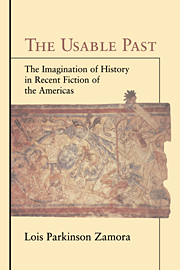Book contents
- Frontmatter
- Contents
- Preface
- Acknowledgments
- PART I ANXIETY OF ORIGINS
- 1 The Usable Past: History as Idea in the Americas
- 2 For the Record: Novels, Newspapers, Narration
- 3 Ancestral Presences: Magical Romance / Magical Realism
- PART II INTERTEXTUALITY AND TRADITION
- Comparative Conclusions: Baroque New Worlds
- Notes
- Index
1 - The Usable Past: History as Idea in the Americas
Published online by Cambridge University Press: 01 September 2009
- Frontmatter
- Contents
- Preface
- Acknowledgments
- PART I ANXIETY OF ORIGINS
- 1 The Usable Past: History as Idea in the Americas
- 2 For the Record: Novels, Newspapers, Narration
- 3 Ancestral Presences: Magical Romance / Magical Realism
- PART II INTERTEXTUALITY AND TRADITION
- Comparative Conclusions: Baroque New Worlds
- Notes
- Index
Summary
We are worried about redeeming the past.
They are accustomed to acclaiming the future.
Their past is assimilated; and, too often, it is simply forgotten.
Ours is still battling for our souls.
Carlos Fuentes, Latin America: At War with the PastIN THESE SCHEMATIC SENTENCES, deployed typographically as I have reproduced them here, Carlos Fuentes places in opposition what he proposes as the current conceptions of history in the U.S. and Latin America. And in what is after more than four decades still the single most influential comparative treatment of the cultures of the Americas, El laberinto de la soledad (The Labyrinth of Solitude, 1950), Octavio Paz precedes Fuentes in contrasting the historical visions of the U.S. and Mexico. Paz also assigns to the U.S. the historical character that Hegel imputed to the entire hemisphere: a place without a past, with only a future. But if Latin America's view of the past is first presented as starkly opposed to that of the U.S., a second look reveals that the two views share a common characteristic: their lack of resolution. Fuentes follows Hegel strikingly in his assertion that the past is not yet usable anywhere in America: if the U.S. has too completely assimilated its past, rendering it inaccessible, Latin America has incompletely assimilated its history, to the same effect.
- Type
- Chapter
- Information
- The Usable PastThe Imagination of History in Recent Fiction of the Americas, pp. 15 - 39Publisher: Cambridge University PressPrint publication year: 1997



